
Task Force for Reconciliation and Education
Reconciliation and Education Task Force holds seminars to educate people who bring about reconciliation from grass root to international level by overcoming various confliction. The seminars offer conflict transformation methods, practice of the dialogue with diverse communities, and learning opportunity about peace building activities by specialists including academics, NGOs and religious communities. Moreover, it puts high value on the problem solving methods based on dialogue and the dignity of life and spirituality, not by violent or military power.
Seminar of Training Facilitators for Peace and Reconciliation
From a tiny dispute within a family to an all-out war between nations,
conflicts never cease to exist. How can religious leaders help bringing
about reconciliation in such hostile situations? How can they play a role
in creating a society that respects diversity and coexistence of peoples
of different faith and backgrounds?
In order to address such challenges, Religions for Peace (RfP) Japan hosted
a series of capacity-building seminar in the past two years to bring up
facilitators for peace and reconciliation. In the seminar, participants
learned how to solve conflicts by dialogue, bearing in mind that those
facilitators must work on spirituality and respects for life. Religious
practitioners, nongovernmental organization members, graduate students
were among around 50 participants.
Back Ground
RfP Japan created a taskforce team for the reconciliation education in April 2016. The team is led by Rev. Toshimasa Yamamoto, a Christian board member of RfP Japan. The team discussed how the religious leaders shall tackle with the issue of reconciliation in the East Asia region, how can they look into the issues of disparity, oppression, discrimination and conflicts in Japan and bring about reconciliation. The team established a common ground of understandings to hold seminars to share the knowledge and skill to a broader group of people.
July 2017#1"Look into Differences"
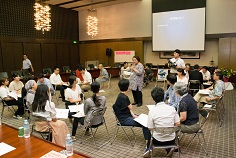
The first seminar took place in July 2017 in Kobe city with “Looking into
differences” as a headline. The main purpose was to let the participants
understand and make good use of diversity. Kobe was chosen as a starting
point because the city has a variety of religious institutions representing
Buddhism, Shintoism, Christianity, Islam and Janism, to name a few.
“We have various kinds of confrontations in the modern society. Culture
of violence is dominating over the culture of peace. We have to think how
to face such confrontations and violence. I’d like you to deepen your learnings
through field works” Rev. Yamamoto said in his opening remark to the participants.
Dr. Kathy Matsui, a taskforce member, gave a lecture titled “What is reconciliation?”
with active learning method. Participants discussed what the necessary
elements of reconciliation are in groups. Then they expressed those elements
by body actions, not by words.
Dr. Matsui held another session of “Understanding diversity”. Participants
discussed about stereotypes and discriminations against different cultures
and learned the importance of not judging others by one’s own standards.
Participants also learned about “Hoʻoponopono”, a traditional Hawaiian
ritual of forgiveness through confession and reconciliation.
In the two days course, participants visited various religious sites in
Kobe to understand and respect different faith.
September 2017#2"Change the Viewpoint"
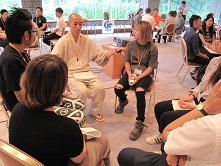
The second round of the seminar was held in September 2017 in Kyoto. The
main theme of this round was to “Change the Viewpoint”. 51 participants
learned about the history of Buraku-min, a socially discriminated people
in Japan from Ven. Kibun Sasaki of Koyasan-Shingon Buddhist sect. “Religious
leaders must work hard on elimination of social discrimination,” Ven. Sasaki
stressed.
Mr. Takashi Watanabe, the representative of a human right advocate group
in the city, pointed out that the views on history and even the historic
facts are often affected by political factors. It is very important to
look into discriminations and human rights issues in daily lives, he said.
Dr. Akiko Ishihara, Assistant Professor at Kumamoto University made a lecture
on “Restorative Justice.” Later she held another session on the restorative
justice with Dr. Mark Umbreit, head of the Center for Restorative Justice
& peacemaking at Minnesota University. With a rich experience of mediation
between the victims and the aggrievers, Dr. Umbreit stressed the importance
of being mindful while working as a facilitator. Dr. Umbreit also made
a dialogue with Rev. Noyu Yamada from Mt. Hiei to discuss the Buddhism
way of forgiving.
December 2017#3"Listen to the Others"
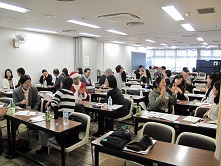
In December 2017, the third seminar was held in Tokyo, to put emphasis
on “Listening” to the others. Participants
were expected to learn how to listen, how to share the pain, agony and
sense of loss of the others, and to build up capabilities of dialogue.
54 participants listened to Ven. Yugaku Ikawa, a Buddhism priest of Shingon
sect, explaining about Clinical Religious Teachers. Himself being a CRT,
Ven. Ikawa introduced what he and his colleagues do. “The role of a CRT
is similar to that of a Chaplain in the western society. We work in public
places in disaster hit areas and hospitals to take mental care of people.
We don’t preach. We respect the values of those whom we listen to. With
our experiences as religious practitioners, we try to embrace the emotions
of those who are struggling with their hardships,” he said.
Ven. Ikawa also spoke about the activities of young monks called “Café
de Monk”. The café opened after the Great East Japan Earthquake in March
2011. Monks created a food truck type café and visited affected area. Their
aim was to establish a place for communication and relief.
Another CRT, Ven. Ryutaro Ikeuchi, explained the importance of “listening”.
Being a doctor and a Shinto priest, Ven. Ikeuchi said “the most important
thing is to listen to others with your responsibility. You need to understand
the thinking and the emotion of people from their point of view, and not
from your own.” “It is no less important to trust the possibilities of
the others. You just help them to help themselves,” he added.
Later, the participants listened to Ms. Naoko Jin, the representative of
a Japanese NPO Bridge for Peace. The NPO is working on the reconciliations
between the peoples of Japan and the Philippines. It creates video messages
of war victims in the Philippines and former Japanese soldiers in the WWII,
and delivering those messages to the other sides. While listening to the
former soldiers, Ms. Jin recognized many regrets aggressive activities
in the war time. Some think if he’s worth living with those past wrongdoings.
“War doesn’t create aggressors and victims. Everyone can become a victim
in the war,” Ms. Jin said.
On the other hand, Ms. Jin said, that by watching video confessions, people
of Philippines started to feel like forgiving those Japanese. Many former
soldiers in Japan hadn’t spoken about their war time experiences. “There
was no room in the Japanese society to talk about such experiences because
the post-war generations didn’t have ears to listen to them,” she said,
arguing if the post-war generations have to bear responsibilities for “not
listening”.
February 2018#4"Accepting the Others"
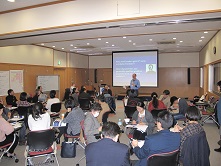
The fourth seminar was held in February 2018 in Tokyo with “Accepting the
others” the main theme. The objective of this round was to learn the skills
for mediation. 34 participants, including religious practitioners, NGO
staffs and students actively joined for the two-day seminar.
This round was more practical than the previous ones. It started with a
lecture by Dr. Kathy Matui on the theory and procedures of workshop building.
Participants learned necessary elements in setting up a workshop ranging
from reference materials to methodologies and objectives. Participants
were separated into four groups and tried to setup workshops by themselves.
Mr. Jon Rudy, a lecturer at the Elizabethtown University in the United
States, was invited to give a briefing on mediation. He explained a mediator
needs a tiered skill; he (or she) must have a solid base of self-recognition
and sincerity. Upon that base, one must have a skill of negotiation and
reconciliation among people, among groups, and among regions and nations,
he said.
He also explained about the step by step procedural approach. In the first
place, there must be a preparatory meeting. In this meeting, mediators
discuss if it’ll be possible to hold a meeting of the concerned parties.
Once such a meeting is held, then a follow-up meeting is also important,
he pointed out.
After the briefing, participants played a mediation roleplay and practiced
necessary skills to mediate. “It is extremely important not only to listen
to what the concerned parties insist, but to understand what they really
want to establish in solving a conflict,” Mr. Rudy stressed.
On the second day, participants made four groups. In each group, they discussed
issues such as happiness to practice various skills necessary for workshop
management. Dr. Matsui and Mr. Rudy gave suggestions and recommendations.
April 2018#5"Restoring Unity"
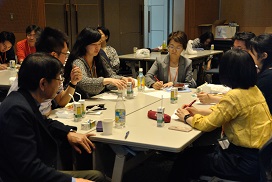
For the fifth round of the seminar, participants visited Fukushima city
in April 2018. Fukushima city is the capital ofFukushima Prefecture, one of the most heavily affected by the Great East
Japan Earthquake. Fukushima city is located inland, but the coastal part
of the prefecture was washed away by huge Tsunami which also triggered
the nuclear power plant disaster.
The two-day session looked into divisions and confrontations on community
level. 34 participants joined the seminar titled “Restoring Unity” to learn
to play a role in providing the people in divided communities with a sense
of unity.
The session started with a lecture by Mr. Shigeta Mimura, a lawyer in the
prefecture working with the people of Fukushima in liability lawsuits in
regard to the nuclear disaster. Participants also listened to the stories
of those who still live in temporary houses. On the second day, participants
visited the temporary houses in two groups and deepen their understandings
of the difficult lives of those residents, most of who were cut away from
their original communities.
July 2018#6"Setting up the Trend"
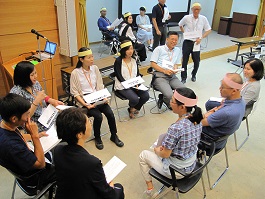
The sixth round of the seminar took place in Tokyo in July 2018 with special
guests from the Middle East.
The two of the guests were from Yezidi community in northern Iraq. Prince
Breen Tahseen, Representative Prince of Yezidi religion in Iraq and the
World (Head of the Supreme Council Spiritual Yezidi), and Dr. Khalaf Merza
portrayed difficult lives of Yezidi people who were under harsh oppression,
torture and attacks by the Islamic State terrorists group. Participants
listened to the presentation and later had a question and answer session
with the two guests.
Another guest, Prof. Mohammed Abu-Nimer, senior adviser to the King Abdullah
International Dialogue Centre (KAICIID) of Saudi Arabia, conducted a workshop
to experience how to overcome conflicts between different religions and
cultures. Dr. Matsui later joined him in another workshop to tackle with
such differences.
In another session, participants played roles in a simulation game of conflict
transference. They were assigned various roles in a conflict that involves
different ethnic and religious groups of people. The debate heated up,
according to a participant, and all recognized how difficult it is to reconcile
in actual conflicts.
September 2018#7"Go Beyond Boundaries"
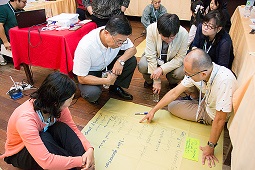
The seminar brought 19 participants to the Philippines in September 2018
as the seventh round of the program to learn from peace process in Mindanao,
where regional conflict between Christian and Muslim population continued
over decades.
On the first day of their six-day tour, Mr. Orson Sargado, Director of
Catholic Relief Services (CRS), gave a briefing on the activities of his
organization. CRS runs exchange program between Christian and Muslim children.
It provides displaced people with mental care. It also works on regional
development. Mr. Sargado explained the backgrounds of the conflict and
told the participants about the role of facilitators. He pointed out that
the conflict in Mindanao is not only that of religious confrontations,
but also based on inequality and social injustice such as land confiscations.
He explained that CRS defines its role as a “bridge” between the government
organizations and the civil society in order to let the voices of the suffering
people be heard. While trying to gain trust among the local population,
it also works hard to establish good ties with all stakeholders such as
government officials, religious leaders, military groups and educational
organizations. A facilitator needs a skill to construct multilateral relationships,
he emphasized.
The second day started with a lecture by Ms. Myla Leguro from Mindanao
Peace Institute. The institute is providing peace building trainings to
religious practitioners, government officials and NGO staffs in Asian countries.
In her lecture titled “Peace Building by Multiple Religions”, Ms. Leguro
pointed out that every religions preach common sense of peace. Religion
was often misused as a tool in confrontations, but can become a foundation
for peace, she said. Religious leaders must guide people toward peace,
she emphasized, and have a role of bringing up problems in religious communities
and regions to political and administrative arena. By doing so, they can
prevent conflicts and solve problems, she added.
Participants broke down to groups to discuss necessary elements of the
peace building, such as “factors”, “players”, “substantial approach” and
“principles”. Participants who discussed about substantial approach pointed
out the necessity to “confirm the will of concerned parties to dialogue”
and “encourage the parties to understand the faith and life history of
the other side”.
Listening to the discussion, Ms. Leguro showed what she calls the “3B”
approach for dialogue facilitation by religious leaders. First B is “Building”,
she said, “to heal your own wounds in the conflict and wipe away prejudice”.
The second B is “Bonding”, that means “to organize your organization and
create a foundation for interfaith cooperation”, to bring about the third
B, which is “Bridging” to “construct trust between different communities
to advance conflict resolutions,” she explained. She didn’t forget to add
the process is “easier said than done,” and suggested to be patient to
the participants.
On the third day, participants moved to Manila to meet with Dr. Lilian
Sison, Secretary General of RfP Philippines and Mr. Pablito Bong Baybado
Jr., Deputy Secretary General of RfP Philippines. Participants learned
about psycho-social programs for ex-child soldiers and victims of the conflicts,
and RfP Philippines’ approach to dialogue with the government and the military.
Participants visited Miriam College in Quezon City the next day to listen
to Dr. Loreta Castro, Program Director and the founder of the Center for
Peace Education, who is one of the most notable figure in peace education
and reconciliation by restorative justice in the Philippines. She spoke
about practical approach to solve problems not by punishment or demonizing
aggressors.
“I learned that we must have correct knowledge and strategy as well as
imagination to create peace. I just want to expand my network to deepen
my study for peace education,” one participant said in the end of the seminar.
“When I learned that the kids in Manila don’t know what’s happening in
Mindanao, I recalled the issue of Okinawa in Japan. We have to be aware
of social affairs,” the other said.
November 2018#8 "Initiating Actions"
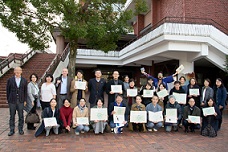
The eighth and the last seminar took place in Minamata city in Kumamoto
Prefecture in the southern island of Kyushu in November 2018. The main
subject that the 43 participants studied was tragic consequences of the
Minamata Disease, which is caused by mercury poisoning. They learned how
the disease caused by a local chemical company harmed the local residence
and divided local communities. They also learned about multiple efforts
by various stakeholders to heal those wounds and restore divided communities.
In a closing ceremony, Rev. Yamamoto gave certificates to all the participants,
saying that the conclusion of the seminar is “not a goal but a start,”
and he was “looking forward to your actions”. In her closing remark, Rev.
Kosho Niwano, a taskforce member, said “we can play facilitators’ role
because we have shortcomings and problems. Having problems is a sad thing,
but I would like to go forward with you to overcome those problems”.